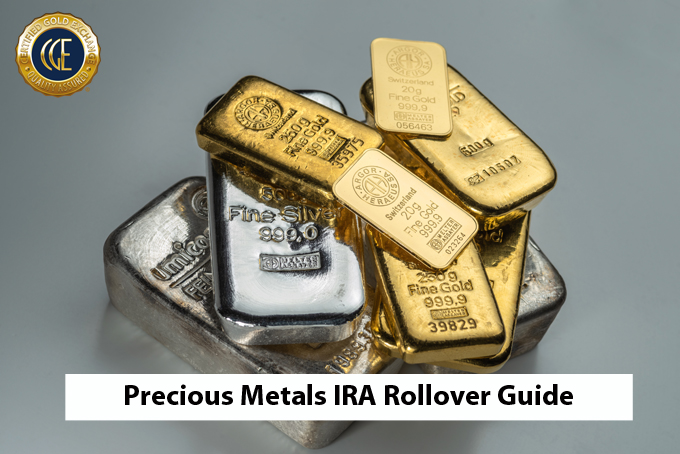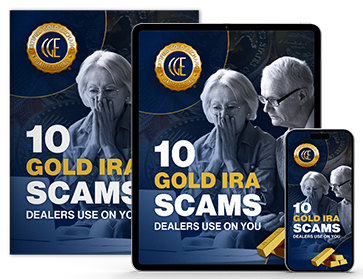Table of Contents
Precious Metals IRA Rollover - Everything You Need to Know to Succeed
This comprehensive precious metals IRA rollover guide will show you how to:
- Choose a Precious Metals IRA Custodian
- Establish Your New Gold IRA Account
- Buy Precious Metals for Your IRA With Volume Discounts
- Avoid Common Gold IRA Company Scams
And we’ll answer the questions that may come up as you investigate whether a precious metals IRA rollover is right for you. Please call us at 800-300-0715 to ensure you purchase metals with our Price Match Plus Guarantee. So let’s start from the beginning.

What is a Precious Metals IRA Rollover?
A precious metals IRA rollover is when you move a Traditional IRA or other retirement account to a Self Directed Individual Retirement Account that can hold physical gold, silver, platinum and palladium at an Internal Revenue Service approved depository.
Self-Directed IRA vs Traditional IRA
A Self-Directed IRA allows you to purchase alternative assets including real estate, precious metals, cryptocurrency and other IRA investments. Although legally permitted per IRS regulations, Traditional IRAs don’t allow you to hold precious metals. They limit your retirement portfolio to traditional investments like stocks, bonds and mutual funds.
Parties Involved When Doing a Precious Metals IRA Rollover
- A self directed IRA custodian to ensure you follow IRS regulations
- A precious metals dealer to help you purchase gold and silver coins
- A depository to safely store and insure your physical precious metals per IRS guidelines
Choosing a Self Directed IRA Custodian
There are two basic types of self directed IRA custodians: those that charge a flat fee to store precious metals or those that use a sliding scale based on the value of your new gold IRA account. We recommend using an IRA custodian with a flat rate storage fee because it’s more cost-effective.
Below are the fees for precious metals IRAs from the two self directed IRA custodians that have a flat storage fee.
Visit our Self-Directed IRA Custodians page for a comprehensive list with links to their fee schedules.
Types of Retirement Accounts Eligible for a Precious Metals IRA Rollover
Traditional, Roth and SEP IRAs are all eligible.
If you have an inactive (old) 401(k), 403(b), 457(b) or TSP, they are also eligible. If you still work with the company that sponsors your retirement portfolio, you may qualify for an “in-service” distribution if you’re 59.5 or older. This simply means you can move a portion of your retirement savings even though you’re still working with the company that sponsored your plan.
Call CGE at 1-800-300-0715 to confirm if your existing retirement account is eligible for a gold IRA rollover.
How to Transfer Funds from Traditional, Roth and SEP IRAs to a Gold IRA
Once your new Self Directed IRA has been set up, you’ll complete a Transfer Request document. This request will transfer funds from your existing retirement account to your new gold IRA.
How to Rollover a 401(k), 403(b), 457(b) or TSP to a Gold IRA
Once you’ve established your new Self-Directed IRA, you will simply call your existing retirement account provider to start the gold IRA rollover process. They will either send a check to your new gold IRA custodian, which is considered a direct rollover. Or they will send the check to you to forward to them, which is an indirect rollover. The best gold IRA companies will contact your current plan administrator with you.
Can I Do a Partial Gold IRA Rollover from My Current Retirement Account?
Yes. Self-Directed IRA accounts are just that, Self-Directed. You alone choose how much to transfer and what assets to purchase. You can choose from platinum and palladium to silver coins or gold bars.
How to Open a Self-Directed IRA
Opening a new Self-Directed IRA is as simple as completing a basic application with your IRA trustee. Your chosen gold IRA company will guide you through the process. Once submitted to your new self directed IRA custodian, your account will typically be set up within 48 hours.
Choosing Your Beneficiaries
Just like with a Traditional retirement account, you’ll have to select beneficiaries. A primary beneficiary is first in line to inherit the account should the IRA owner pass away. A contingent beneficiary would be next in line to inherit the account should the IRA owner and the primary pass away simultaneously.
If you live in one of the following community property states Arizona, California, Idaho, Louisiana, Nevada, New Mexico, Texas, Washington or Wisconsin, your spouse must be your primary beneficiary. Unless, they choose to forgo that right and sign a release on your application.
Interested Party vs Designated Representative Option on Precious Metals IRA Application
The Interested Party designation allows a 3rd party, such as precious metals dealers, to speak with the IRA custodian on your behalf. It is safe and effective because it permits them to obtain information about your account but DOES NOT authorize investing in precious metals without your written authorization.
The Designated Representative option authorizes a Power Of Attorney on your account. DO NOT give this authority to a precious metals dealer. In certain circumstances, an attorney, CPA, or family member may be issued a POA. If you’re working with a gold IRA company that is requesting you assign them as a Designated Representative, call us at once at 1-800-300-0715.
How to Buy Precious Metals for your Self-Directed Gold IRA
To purchase gold and silver for your precious metals IRA, you need to sign an Investment Direction form. This document will outline your quantity, description and cost per item. Your gold IRA company will help you to complete the document. Call CGE at 1-800-300-0715 to confirm you’re buying at the best possible price; it takes less than 2 minutes.
If a gold IRA company insists you don’t need to sign an Investment Direction form, beware. They already have Power of Attorney on your account and will sign the document for you. Some unscrupulous gold IRA companies prefer this method so you never get to see in writing exactly what you’re buying. And they authorize the transaction for you because you’ve appointed them a Designated Representative.

Types of Physical Precious Metals You Can Hold in Your Self-Directed IRA
Physical gold and silver are the most common by far. But other precious metals, like platinum and palladium bullion coins and bars can also meet IRS guidelines.
IRS regulations do not permit you to invest in 3rd party graded silver or gold coins within precious metals IRAs. The only collectible coins allowed in retirement accounts are American Eagle proofs issued by the U.S. Mint.
Buy/Sell Spread (How Much Your Precious Metal Will Cost You)
The “spread” is a term most gold IRA companies don’t want you to know because you sound like you know what you’re talking about. The buy/sell spread is the difference between what a precious metals dealer will buy and sell an item for. The buy/sell spread is how precious metals dealers make their money.
A quick glimpse at the contracts of many Southern California gold IRA companies will reveal spreads between 33-65%. Which means they’re going to charge you anywhere from 33% to 65% more than their costs to acquire your precious metals investments.
If you’re already working with a gold IRA company and want to make sure you don’t lose a huge chunk of your retirement savings, call CGE at 1-800-300-0715.
Commingled and Segregated Storage Options
Once you acquire your precious metals investments, you get to choose how you want them stored. All approved depositories offer two types of storage: segregated or commingled.
Segregated storage is typically reserved for gold investments, or platinum and palladium as well. Your precious metals will be held in a private safety deposit box at the depository.
Commingled storage is when your metal is stored in your custodian’s segregated section of the vault but commingled with other customers’ metals. If you acquire silver bullion as part of your investment strategy, you will have to store your precious metal commingled.

Custodial Valuations of Precious Metals IRAs
Self-Directed IRA custodians use one of the three methodologies to determine the value of your precious metal.
- The melt-down spot price of the weight of each bar or coin.
- They receive a third-party depository or website pricing.
- They ask the client to provide fair market value.
The most common method used to value your gold IRA investments is the spot price melt down valuation. Whereas, the custodian will multiply the number of ounces you hold by the spot price. Below is a screenshot from Strata Trust and how they use the spot price to “value” precious metals IRAs.
How Do I Sell The Gold Or Silver in My IRA?
You simply contact your gold company to execute an Investment Direction form that authorizes them to liquidate the metals in your IRA account. Visit our Sell a Gold IRA page for more details.
How Do I Take My Required Minimum Distribution (RMD) From My Precious Metals IRA?
Per IRS regulations, once you reach 72 you have to take RMDs if you have a Self Directed Traditional IRA. Roth IRAs are exempt. An RMD is a normal taxable distribution.
But with a precious metal IRA, you can take your RMD in one of two ways. You can sell a portion of your gold, silver or other precious metals and take your RMD in cash.
Or you can take an “in-kind” distribution and have the cash equivalent of your precious metals sent to your home which can have tax benefits.
How Can I Avoid Overpaying for My Precious Metals?
Avoid the following:
- “Best Gold IRA Company” paid review sites
- Conservative spokesperson endorsements
- Free gold & silver coin promotions
- Dealers willing to pay your custodian fees
- Buying obscure or “premium” coins
- TV & YouTube commercials with celebrities
- Expensive NRA or NASCAR type endorsements
- Gold companies in Los Angeles and the surrounding area
Visit our Gold IRA Scams page for more details.
Why Does CGE Prefer Delaware Depository for Safekeeping My IRA Metals?
Although there are multiple options to store precious metals, CGE prefers the Delaware Depository (DDSC). DDSC has locations on both the East and West coasts. CGE and our partners maintain accounts at DDSC. So when you want to buy and sell precious metals investments from your gold IRA, you don’t have to pay shipping costs. The transfer happens internally which saves you time and money.
Pay Less By Purchasing Directly from the Certified Gold Exchange
If you want to pay less when you invest in gold, silver, platinum and palladium, call CGE at 1-800-300-0715. We search the nation for the lowest prevailing price of the day on your preferred items, and then we beat it. You get an email with the lowest-priced search results before committing to your purchase.
How Silver and Gold IRAs Have Performed Versus The Stock Market
Precious metals have been allowed in IRAs since August of 1997. Since that time:
- Gold has averaged 20.62% per year.
- Silver has averaged 16.87% per year.
- DJIA has averaged 12.40% per year.
These figures were updated on November 1st.
Source:
- https://www.kitco.com/charts/historicalgold.html
- https://www.kitco.com/charts/historicalsilver.html
- https://www.sec.gov/Archives/edgar/data/357298/000035729801500016/dowjones.html
The Most Important Question: How Do I Find A Reputable Precious Metals Dealer?
Three stand-up firms have been in business for more than 20 years without a single client complaint. Contact us at 1-800-300-0715, and we’ll provide you with their names and contact information. CGE is one of them.
Of the three firms, the Certified Gold Exchange is the only one whose focus is on helping investors open a precious metals IRA. Call us for your IRA rollovers, and we will help you to acquire the physical metals for your gold individual retirement account.
Written by Pat Collins and John Halloran

Avoid These 10 Gold IRA Scams.

DEALERS USE ON YOU







